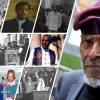The timeless texts and teaching of Haji Malcolm X are a vital contribution to defining and reaffirming the indispensable, urgent and ongoing need to cultivate and sustain critical consciousness in the service and interests of our people, our liberation struggle and the good of the world. Indeed, his teachings on critical consciousness are especially relevant and valuable in this context in which right-wing political poseurs and plunderers are outlawing critical forms of learning, criminalizing critical thinking, banning and burning books, erasing, fictionalizing and falsifying history, denouncing and dismissing empathetic understanding and appreciation of others different, and reductively translating and distorting the original and rightful meaning of becoming and being woke.
Haji Malcolm, who continued this conversation on being woke originating as early as the 19th century with activist intellectuals like Nana Maria Stewart and Nana David Walker, places critical consciousness, waking up and staying woke, at the beginning of his three required, central and interrelated liberational practices: “waking up, cleaning up and standing up”. In my forthcoming major work, The Liberation Ethics of Haji Malcolm X, I translate these three interrelated liberational expressions of African and human agency as critical consciousness, moral grounding and transformative struggle. In the Black Freedom Movement, especially the Black Power phase, which was heavily influenced by Haji Malcolm’s teachings, we of Us defined critical consciousness as a radical awareness of self, society and the world committed to liberated and liberating ways to understand and assert ourselves in the world and in revolutionary opposition to racism, capitalism and colonialism in their various forms throughout the world.
Kawaida philosophy, which I developed in the midst of the ideological and social struggles of the Black Freedom Movement and which builds on Haji Malcolm’s teachings, emphasizes the acquisition of a critical consciousness that is both liberated and liberating. It is liberated in that it is free from oppressed and oppressive ways of thinking and feeling. And it is liberating in that it contributes to the achievement of freedom in both the psychological and social or political sense.
In his cultivation of critical consciousness, Seba Malcolm defines the process also as gaining liberating and uplifting knowledge, truth that frees, anchors and elevates at the same time and causes one to clean up and stand up in resistance in righteous and transformative ways. Within this context, he emphasizes and explains in his liberation ethics five fundamental aspects and forms of critical consciousness: religious, historical, cultural, social and reflective. Min. Malcolm’s concept of a religious consciousness obligates him and us to strive to live a morally grounded life, to speak truth and do justice, to be and do good, and avoid and actively oppose evil, injustice and oppression in the world.
Seba Malcolm sees historical consciousness as the indispensable and foundational field of knowledge in critical consciousness, especially given the conditions of forced and cultivated historical amnesia and the falsification of history by a brutal, racist and colonial oppressor. He begins his essential lectures in African American history by noting that his lecture series is “designed to give us a better knowledge of the past, in order that we may understand the present and be better prepared for the future” and pursue the good. Thus, he states that “of all our studies, history is best qualified to reward our research”.
The third field of focus and engagement with critical consciousness in Haji Malcolm’s liberation ethics is cultural consciousness, with culture as a self-defining, self-distinguishing whole way of life of a particular people. Thus, Haji Malcolm tells us that “We must recapture our heritage and identity if we are to liberate ourselves from the bonds of white supremacy”. Here he links history and culture under the concept of heritage, calls for a cultural revolution and affirms culture’s revolutionary role as “an indispensable weapon in the freedom struggle”.
Min. Malcolm’s liberation ethics also seeks to cultivate and raise the social consciousness of his people as another aspect of the moral imperative and obligation to wake up, clean up and stand up in the interest of liberation. In his ethical teachings, I read in his concept of social consciousness several interrelated understandings: a shared self-awareness grounded in our history, culture, life conditions, and lived and living experiences; a competent awareness of critical issues confronting us and the world; and a moral concern and responsibility for engaging and solving these critical issues, especially in the context of the ongoing liberation struggle.
Finally, in addition to Nana Malcolm’s stress on religious, historical, cultural and social consciousness in the cultivation and development of critical consciousness, an awake and engaged consciousness, is his emphasis on reflective consciousness. By definition, waking up as critical consciousness is a reflective consciousness and thus, whether we are talking about religious, historical, cultural or social consciousness, the principle and practice of reflection is present. Haji Malcolm values critical reasoning highly and he constantly challenges his audiences to reason with him, to think deep and with self-determination. Thus, he calls for us to develop “a new system of reason and logic”, a logic of liberation, in our righteous and relentless struggle to achieve and sustain liberation and shared good in the world.
When Haji Malcolm is asked the question, “What are Black people to wake up to?” he replies in summary that they are to “wake up to their humanity, to their own worth and to their heritage”. This means to wake up in depthful and life-enhancing ways to our status as bearers of dignity and divinity, worthy of the highest respect; to the ancient and instructive history and creative culture which grounds and defines us; and to the need to continue to struggle righteously and relentlessly to create and sustain conditions of freedom and flourishing that enable us to come into the fullness of our African and human selves. It is this remembrance and rightful representation of critical consciousness, the radical awareness of being woke, that the right-wing and its open and complicit supporters, handmaidens and hirelings have sought to distort, discredit and destroy. And it is a legacy we must lift up, live, defend and advance in the most ethical, effective and expansive ways in the interest of African and human good and the well-being of the world.















